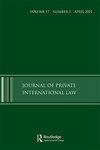Public law adjudication, international uniformity and the foreign act of state doctrine
IF 0.5
Q3 LAW
引用次数: 4
Abstract
Should courts, when applying foreign law, assess the validity or legality of foreign legislative or executive acts therein? The foreign act of state doctrine answers that question in the negative, but is often criticised as lacking a sound theoretical basis. This article argues, however, that the doctrine remains defensible if reconceptualised as a rule of private international law, which furthers the modest goal of international uniformity within the choice-of-law process. Assessing the validity or legality of foreign legislative and executive acts necessarily requires courts to address questions of foreign public law. Given the fact-specific and flexible nature of public law adjudication, courts cannot answer these questions, and thus cannot carry out such assessments, in a manner that loyally applies foreign law. The doctrine, then, makes the best of a bad situation, by sidestepping that problem with a clear rule of refusal which, if consistently applied, furthers international uniformity.公法裁判、国际统一与外国国家行为学说
法院在适用外国法律时,是否应该评估外国立法或行政行为的有效性或合法性?外国国家行为学说否定地回答了这个问题,但经常被批评为缺乏健全的理论基础。然而,这篇文章认为,如果该学说被重新定义为国际私法规则,它仍然是可以辩护的,这进一步推动了在法律选择过程中实现国际统一的适度目标。评估外国立法和行政行为的有效性或合法性必然要求法院处理外国公法问题。鉴于公法裁决的具体事实和灵活性,法院无法回答这些问题,因此无法以忠实适用外国法律的方式进行此类评估。因此,该学说充分利用了糟糕的情况,通过明确的拒绝规则来回避这个问题,如果一贯适用,将促进国际统一。
本文章由计算机程序翻译,如有差异,请以英文原文为准。
求助全文
约1分钟内获得全文
求助全文

 求助内容:
求助内容: 应助结果提醒方式:
应助结果提醒方式:


